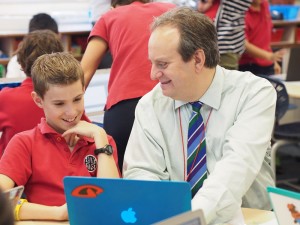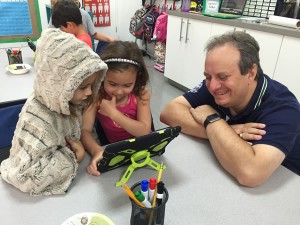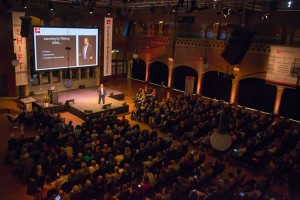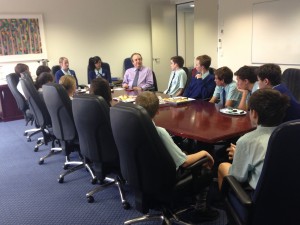“Some people think outside of the box. Gary is unaware of the box’s existence.”
– Futurist, Dr. David Thornburg
About Gary Stager
I’ve spent more than three decades helping teachers across the globe make the world a better place for kids. My work is dedicated to the proposition that things need not be as they seem.
A Wise Investment
Dr. Stager contributes to a successful conference or professional learning event by:
- Modeling exemplary teaching practices with students and teachers
- Offering a “Conversation with Gary Stager” session following the keynote
- Presenting additional breakout sessions or participate in panel discussions
- Leading hands-on workshops
- Participate in planning sessions, brainstorming or executive briefings
- Collaborating with students
- Communicating with parents or the community
- Media availability
- Family workshops
Learn more about Gary Stager
- Countless publications
- Video library (including three TEDx talks)
- Summer institute
- Speaking, consulting & professional development and mentoring services
- Reviews of Dr. Stager’s work
- Publishing company, CMK Press
- Publicity photos
Short Bio
Gary Stager is one of the world’s leading experts and advocates for computer programming, robotics and learning-by-doing in classrooms. In 1990, Dr. Stager led professional development in the world’s first laptop schools and played a major role in the early days of online education. In addition to being a popular keynote speaker at some of the world’s most prestigious education conferences, Gary is a journalist, teacher educator, consultant, professor, software developer, publisher, and school administrator. An elementary teacher by training, he has taught students from preschool through doctoral studies. Gary is the founder of the Constructing Modern Knowledge summer institute for educators.
Dr. Stager is co-author of Invent To Learn – Making, Tinkering, and Engineering in the Classroom, called the “bible of the maker movement in schools,” by Larry Magid of CBS and The San Jose Mercury News.
When Jean Piaget wanted to better understand how children learn mathematics, he hired Seymour Papert. When Dr. Papert wanted to create a high-tech alternative learning environment for incarcerated at-risk teens, he hired Gary Stager. This work was the basis for Gary’s doctoral dissertation and documented Papert’s most-recent institutional research project.
When not on the road speaking or consulting, Dr. Stager serves as the Special Assistant to the Head of School for Innovation at The Willows Community School in Culver City, California.
Dr. Stager’s work has earned a Ph.D. in Science and Mathematics Education and a Grammy Award.
Gary is also on the advisory board of the NSF-funded project, BJC4NYC: Bringing a Rigorous Computer Science Principles Course to the Largest School System in the US.
Long Bio
 Since 1982, Gary Stager, an internationally recognized educator, speaker and consultant, has helped learners of all ages on six continents embrace the power of computers as intellectual laboratories and vehicles for self-expression. He led professional development in the world’s first laptop schools (1990), has designed online graduate school programs since the mid-90s, was a collaborator in the MIT Media Lab’s Future of Learning Group and a member of the One Laptop Per Child Foundation’s Learning Team.
Since 1982, Gary Stager, an internationally recognized educator, speaker and consultant, has helped learners of all ages on six continents embrace the power of computers as intellectual laboratories and vehicles for self-expression. He led professional development in the world’s first laptop schools (1990), has designed online graduate school programs since the mid-90s, was a collaborator in the MIT Media Lab’s Future of Learning Group and a member of the One Laptop Per Child Foundation’s Learning Team.
When Jean Piaget wanted to better understand how children learn mathematics, he hired Seymour Papert. When Dr. Papert wanted to create a high-tech alternative learning environment for incarcerated at-risk teens, he hired Gary Stager. This work was the basis for Gary’s doctoral dissertation and documented Papert’s most-recent institutional research project.
Gary’s recent work has included teaching and mentoring “troubled” public schools, launching 1:1 computing in a Korean International School beginning from 1st grade up, media appearances in Peru and serving as a school S.T.E.M. Director. He was a Visiting Professor at Pepperdine University and Senior Editor of District Administration Magazine. His advocacy on behalf of creativity, computing and children led to the creation of the Constructivist Consortium and the Constructing Modern Knowledge summer institute.
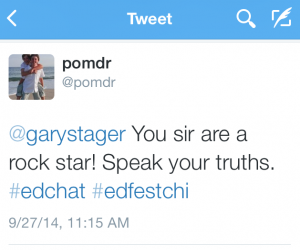 In 1999, Converge Magazine named Gary a “shaper of our future and inventor of our destiny.” The National School Boards Association recognized Dr. Stager with the distinction of “20 Leaders to Watch” in 2007. The June 2010 issue of Tech & Learning Magazine named Gary Stager as “one of today’s leaders who are changing the landscape of edtech through innovation and leadership.” CUE presented Gary with its 2012 Technology in Learning Leadership Award. A popular speaker, Dr. Stager was a keynote speaker at the 2009 National Educational Computing Conference and at major conferences around the world. He has been a Visiting Scholar at the University of Melbourne’s Trinity College on several occasions.
In 1999, Converge Magazine named Gary a “shaper of our future and inventor of our destiny.” The National School Boards Association recognized Dr. Stager with the distinction of “20 Leaders to Watch” in 2007. The June 2010 issue of Tech & Learning Magazine named Gary Stager as “one of today’s leaders who are changing the landscape of edtech through innovation and leadership.” CUE presented Gary with its 2012 Technology in Learning Leadership Award. A popular speaker, Dr. Stager was a keynote speaker at the 2009 National Educational Computing Conference and at major conferences around the world. He has been a Visiting Scholar at the University of Melbourne’s Trinity College on several occasions.
Gary was the new media producer for The Brian Lynch/Eddie Palmieri Project – Simpatíco, 2007 Grammy Award Winner for Best Latin Jazz Album of the Year. Dr. Stager is also a contributor to The Huffington Post and a Senior S.T.E.M. and Education Consultant to leading school architecture firm, Fielding Nair International. Gary also works with teachers and students as Special Assistant to the Head of School for Innovation at The Willows Community School in Culver City, California. He is the Publisher at Constructing Modern Knowledge Press.
Gary is also on the advisory board of the NSF-funded project, BJC4NYC: Bringing a Rigorous Computer Science Principles Course to the Largest School System in the US.
Expertise
- Coding in K-12 classrooms
- The maker movement
- S.T.E.M.
- Early Childhood Education, including the Reggio Emilia Approach
- 1:1 computing
- At-risk learners
- School reform
- Teacher education
- The politics of public education
- Schools where kids love to learn
- Parenting in the digital age
- Turning off the school to prison pipeline
Press
Gary has appeared in The New York Times, Wall Street Journal, NPR’s All Things Considered, Nature, Chronicle of High Education, Parade Magazine, Wired, The Huffington Post, Edutopia, Scholastic Administrator, District Administration, Technology and Learning, Education Week, American School Boards Journal, California School Business Magazine, Educational Leadership, Learning and Leading with Technology, Technology and Learning, ASCD Education Update, Converge, Logo Exchange, eSchool News, The Age (Melbourne Australia), Education HQ (Australia) Crikey (Australia), as well as public radio (US), the ABC (Australia) and Peruvian television.
Clients include
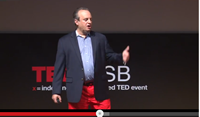
Intel, Apple, LEGO, Toshiba, Microsoft, Disney, Universal Studios, Logo Computer Systems, Inc., Tom Snyder Productions, Claris, ICT Qatar, Fundacion Omar Dengo (Costa Rica), Generation YES, Victoria Department of Education, New South Wales Department of Education, Queensland Department of Education, Australian Capital Territory Department of Education, Compaq, One Laptop Per Child, Telefonica (Peru), and schools around the world.
International Perspective
Gary has worked, studied, or spoken in Australia, Canada, China, India. Hong Kong, Brazil, Mexico, Peru, New Zealand, Poland, England, Lithuania, Bulgaria, Spain, Costa Rica, Slovakia, France, Thailand, Italy, Austria, Turkey, The Netherlands, Denmark, South Africa, Singapore, Belgium (2017), Philippines (2017) and across the United States.
Contact Info
Websites: http://stager.tv/ | http://inventtolearn.com | http://dailypapert.org | http://constructingmodernknowledge.com | http://cmkpress.com
Twitter: @garystager
Workshops
PBL 360 – Immersive 3-4 Day Workshops
Catalog of One-Day Minds-On Workshops
Sample Presentation Topics
Making, Love, and Learning
Learning outside of school is being transformed by the trends of tinkering, maker culture and personal fabrication. Educators need to be mindful of this major shift in digital learning, married to craft traditions, and student agency to create productive contexts for learning.
The Maker ethos of constructionism, or learning-by-making through first-hand experience will be explored in the context of projects using a range of analog and digital “construction” materials. Children can now use technology to create and solve their own problems. Affordable tools and materials, such as 3-D printers, laser cutters, Arduino microntrollers, MaKey MaKey construction kits, conductive paint and wearable computing components allow students to go farther than was imagined just a few years ago. Junk, high-tech gear, art supplies and engineering principles collide to expand human potential.
Art and science converge and are amplified by computing. When the artificial boundaries between subject areas are blurred and every student requires the same process skills and tools, the distinction between vocational and academic education are obliterated. In order for schools to seize the opportunities afforded by this “Maker” spirit, educators need more than awareness that the world is changing. They need to develop new skills and redesign classroom environments to support learner-centered practices in order to prepare kids to solve problems their teachers never anticipated..
Making School Reform
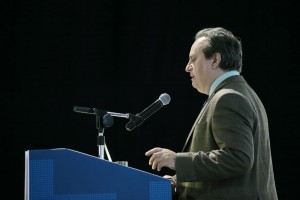 The social and technological revolution known as the maker movement offers unprecedented opportunities to learn and amplify human potential. Making inspires education reform and schools require substantive change in order to maximize the affordances of learning through firsthand experience. Examples of making, tinkering and engineering, in and out of the classroom, will be shared in order to address five critical areas of focus for those interested in leveraging the maker movement to make schools more productive contexts for learning.
The social and technological revolution known as the maker movement offers unprecedented opportunities to learn and amplify human potential. Making inspires education reform and schools require substantive change in order to maximize the affordances of learning through firsthand experience. Examples of making, tinkering and engineering, in and out of the classroom, will be shared in order to address five critical areas of focus for those interested in leveraging the maker movement to make schools more productive contexts for learning.
The five big ideas include:
- Elevated expectations for literacy
- A new mathematical diet for children
- Shaping the learning environment
- Kid power
- Continuous teacher growth
The Learning Revolution You Can’t Afford to Miss
Learning outside of school is being transformed by several trends based on learning by firsthand experience. Several technological game changers are reanimating active learning, tinkering and apprenticeship. Hundreds of thousands and children and adults are coming together to celebrate creativity, ingenuity and invention in the context of projects using a range of analog and digital “construction” materials. For school leaders, the immediate challenge is to create productive contexts for learning where there are greater opportunities for inquiry, project-based learning and student leadership, regardless of gender, ethnicity or socio-economic status. When the artificial boundaries between subject areas are blurred and every student requires the same process skills and access to tools, the distinction between vocational and academic education must be obliterated.
In order for schools to seize the opportunities afforded by rapidly expanding “maker” movement, educators need more than awareness that the world is changing. They need to develop new skills and redesign classroom environments to support learner-centered practices. New curricular diets may need to be created. School only serves 21st Century learners when it prepares them to solve problems that their teachers have yet to anticipate.
In this provocative keynote, Dr. Stager will provide examples innovative classroom practices and examples of students learning by doing with active knowledge construction. Advice for how schools may join the maker movement will be shared as well.
The Best Educational Ideas in the World – Tickets to Constructing Modern Knowledge
Program Abstract: There are places where the desires, talent and competence of children are nurtured, celebrated and respected. This presentation will take you on an expedition to some of the world’s best educational ideas. Each stop on the tour shares inspiration from learning contexts built upon young people’s remarkable capacity for intensity. These ideas provide a foundation for meeting the needs of each child, technology integration, increased teacher quality or the fuel for sustaining innovation. While viewed in isolation, these ideas might inspire incremental solutions to specific problems. Combined, they represent educational transformation.
Session Description: Stand on the shoulders of giants as you tour the best educational ideas in the world! Along the way you’ll explore Reggio Emilia, Fab Labs, El Sistema, 826 Valencia and more. Each “idea” shares common principles of natural learning, creativity, child competence, collaboration,, apprenticeship, authentic tools , relevance, serendipity, beauty, respect and technology used to amplify human potential. Lessons learned en-route create productive contexts for learning where students construct the knowledge required for a rewarding life. Principles of effective project-based learning will be shared.
Schooling has always been shaped by contemporary technology. Digital technology creates opportunities to learn what we have always expected of children, perhaps with greater efficacy, efficiency or comprehension. However, the real power lies in using the computers to learn new things in new ways that may have never been possible.
The challenge for even the most imaginative schools is to sustain innovation. While the technology may catalyze changes in practice, ideas bigger than the technology create a productive context for sustaining innovative practice. This presentation will explore some of the best educational ideas in the world and demonstrate how they may support or require transformational computing activities.
The big ideas include:
- Reggio Emilia
- The Big Picture
- One Laptop Per Child
- Constructionism
- The Venezuelan Youth and Children’s Orchestra
- The Maker Movement
- Generation YES
- 826 Valencia
My Hope for Schools
From imagine it project on Vimeo.
Electrifying Children’s Mathematics (Gary Stager Keynote, Workshop or Online Course)
There may be no greater gap between a discipline and the teaching done in its name than when the beauty, power and mystery of mathematics become math instruction. One can only begin to address the systemic challenges of math education by understanding the nature of mathematics and the power of computing. Nearly 100 years of efforts to increase achievement with unchanged curricular content continues to fail spectacularly; yet, we do not change course. Surely, the widespread availability of computational technology demands new pedagogical approaches and a new diet of mathematics.
This keynote/workshop moves beyond the goal of making math instruction engaging for children by providing educators with authentic mathematical thinking experiences. Such experiences acknowledge the role computers play in mathematics and society’s increasing demand for computational thinking. Project-based approaches with mathematics at the center of the activity will be explored. Traditional concepts such as numeracy, geometry, probability and graphing will be investigated in addition to exciting new branches of mathematics rarely found in the primary grades.
This keynote/workshop is designed for teachers of grades K-8. It may also be offered as an ongoing course with a greater emphasis on curriculum development and action research.
Strategies for Hands-on Learning
Digital Reggio: Where Tinkering & Engineering Meet Progressive Education (keynote or workshop)
Participants will learn how the use of computational and constructive technology may be used in a fashion consistent with the principles of the Reggio Emilia approach Participants will explore how computers and robotics elements may be combined with traditional materials for inquiry-based knowledge construction by young children. Such digital materials expand the “hundred languages of learners.” Participants will expand their notions of what is possible with technology and young children as a means to construct knowledge, express creativity and amplify the potential of each young learner.
Ten Things to Do with a Laptop – Learning & Powerful Ideas
Seymour Papert and Cynthia Solomon wrote a paper in 1971 called, “Twenty Things to Do with a Computer.” Few of today’s schools, with or without laptops, satisfy the goals of that thirty-five year-old document. This keynote invokes the challenging vision of the earlier document, updates it and presents ideas for using laptops in ways that offer unprecedented learning adventures across K-12 and various subject areas. The broader vision of using computers as intellectual laboratories and vehicles for self-expression is equally appropriate for educators with one or thirty computers in their classroom.
Ten Things To Do With a Laptop (keynote in Iowa)
20 Lessons from 25 Years of 1:1 Computing
No educator has more experience leading professional development in as many 1:1 schools as Dr. Gary Stager. During this keynote, Gary will reflect upon lessons learned in the twenty years since he worked with the world’s first laptop schools (1990). Twenty pivotal lessons will be shared with video-based examples and recommendations for sustaining innovation. This session is ideally suited for policy-makers, but touches on teaching, learning, curriculum, planning, policy, leadership and implementation issues.
Learning Adventures – A New Approach for Transforming Real and Virtual Classroom Environments
The emphasis of the learning adventures is on the learning process while traditional assignments focus on product. My students provide constant formative assessment, expertise and assistance to their classmates since they are in the same virtual space around-the-clock and because their work is public. The teacher’s role shifts from one of judgment to one of supporting each learner. Even face-to-face classes benefit from non-coercive open-ended transparent learning adventures. Critical factors of learning adventures will be presented as well as their theoretical foundations.
Young Tom Edison and the Ballerina’s Gopher
A new one-man show perfect for a keynote address
Veteran educator Gary Stager leads a tour through the type of learning adventures only possible with abundant access to constructive technology. Realizing the educational potential of all students requires radically different learning environments that in your heart you know are correct, but you may lack the courage to create. Gary will inspire us to imagine computing without PowerPoint, schools without losers and the possibility that reality television represents a positive educational trend.
Digital Democracy – High-tech Activities and Policies Essential for Modern Citizenship
This session explores high-tech activities designed to inspire student political participation at a variety of grade levels. The Internet has changed politics and what it means to be a modern citizen. In an age when candidates host online discussions, political organization depends on meetup.com and elections are won or lost on YouTube, it is vital that students master the tools and media techniques of their age, including: data analysis, simulation building, polling and propaganda creation.
In addition to mastery of the tools and techniques essential for civic participation, this session will explore the network and democratic policies required if students are to develop as productive citizens.
The computer, Internet and constructivist software will be used to address:
- The mathematics of polling
- Making sense of data
- Effective communication
- Propaganda creation
- Online community building
- Civic participation
- Changing the world
Rethinking At-Risk Education: Successful Learner-Centered Alternatives to Conventional Practice
(Alternate title: The Adventures of Gopher-cam and Other Amazing Tales of At-Risk Kids & Technology)
Imagine a joyful research-based environment where teenage students, previously sorted by pathology, become engineers, poets, composers, computer scientists, broadcasters, astronomers or luthiers. Constructionist learning theory, ubiquitous computing and strategies associated with the Reggio Emilia approach guided the creation a multi-age environment in which severely at-risk learners developed sophisticated habits of mind by engaging in the construction of long-term personally meaningful projects. Research and video examples provide remarkable evidence of sophisticated student learning and three years without a discipline incident.
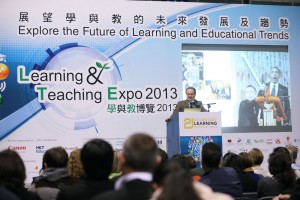
What Others are Saying
“Any conference seeking a keynote speaker to provoke its attendees to think deeply about authentic learning and inspired teaching should get in line to request Dr. Gary Stager. He sees through the No Child Left Behind fog with laser vision with eye-opening suggestions on how to truly engage and challenge learners. Having seen Gary work with children around the world, I can attest that Gary is a true champion of children.” – Peter H. Reynolds, award-winning author, illustrator, and animator.
“Gary is a well informed educational reform thinker. He brings a wealth of knowledge and passion to his speaking engagements and challenges people to think about the best possible learning environments we can create for students to be successful in their lives. Gary has been well received by audiences around the world.”
– Holly Jobe –[past] President of the International Society for Technology in Education
“Gary Stager is a unique speaker who never fails to entertain, inform, and inspire. Gary’s offers a unique combination of intellect and wit that provokes conversation and smiles alike. He is a committed educator who comes to a conference ready to roll up his sleeves and work. Gary can have audiences on their feet cheering at a keynote and a half hour later be fielding questions and presenting his latest ideas in a breakout session or at a conference reception. He is straight talking, fearless, and a visionary educational leader who ‘tells it as it is’. Gary’s presence has always brought our conference to another, higher, level.”
– Pete Reilly, [past] President New York State Association for Computers & Technology in Education
The great thing about Gary is that he never gives up. He was there at the beginning of the great transformation of learning via the medium of portable computers, at the first school to implement laptops, Methodist Ladies College, Melbourne, in 1990. Fifteen years later, Gary’s still at the forefront, still showing the way, still walking the walk in his inimitable style. His work – particularly among the most challenged students, like the juvenile offenders incarcerated at the Maine Youth Center — provides conclusive proof that kids can learn better through the intelligent use of technology.
– Bob Johnstone, author of Never Mind the Laptops: Kids, Computers and the Transformation of Learning, the premiere history of laptops in education
Publications
Book: Invent To Learn – Making, Tinkering, Engineering in the Classroom
Book (contributor): The Muses Go to School: Inspiring Stories About the Importance of Arts in Education
A book chronicling the history of 1:1 computing, of which Gary played a major role – Never Mind the Laptops: Kids, Computers, and the Transformation of Learning
Grammy Award-winning CD (new media producer): Simpático – The Brian Lynch/Eddie Palmieri Project
A Selection of Previous Engagements
Keynote: 2009 National Educational Computing Conference. Washington, D.C. (5,000 attendance in hall)
Keynote: 2010 International Middle Years of Schooling Conference. Adelaide, Australia.
Keynote: (2012, 2013, 2014) Edutech, Australia’s largest education conference (4000 attendance)
Keynote: Stanford University FabLearn 2013 Conference
Spotlight Speaker: International Conference on Teaching and Learning with Technology. Singapore.
Keynote: (2013) 21st Century Learning Conference. Hong Kong
Keynote Speaker: (2014) Expanded Learning Horizons and Schooltech Conference. Lorne, Australia (4th time keynoting)
Keynote Speaker: (2014) Northwest Conference on Computers in Education (NCCE)
Keynote Speaker: (2010) The 3rd Annual ICT in Education Conference. Doha, Qatar.
Keynote Speaker: (2010) The European Laptop Institute. The Hague, Netherlands.
Featured Speaker (2012 & 2014): ASB Unplugged. Mumbai, India
Featured Speaker: (2014) National School Boards Association Conference
Featured Speaker: 2013 NY World Maker Faire & 2014 Bay Area Maker Faire (countless other Maker Faire presentations since 2012)
Gary keynotes a dozen or more conferences per year and has lead popular sessions at conferences including: NAEYC, ASCD, NSBA, NASSP, WCCE, ACCE, NCTM, the Laptop Institute, NYSCATE, CUE, Educon, and regional and national conferences around the world.
Booking Enquiries
Contact Gary [at] stager.org

